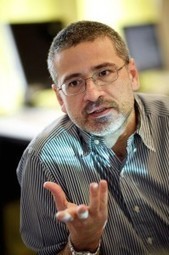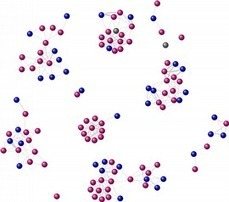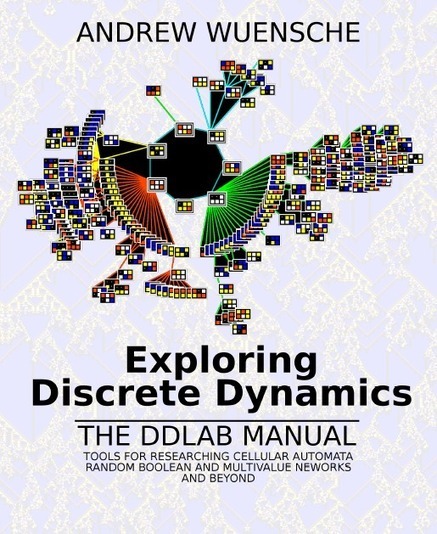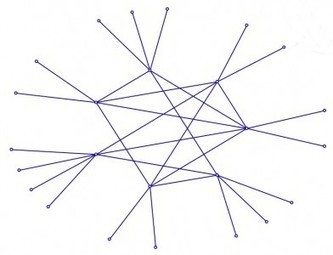 Your new post is loading...
 Your new post is loading...

|
Scooped by
Complexity Digest
October 14, 2012 11:31 PM
|
Alessandro Vespignani, one of the most active and distinguished researchers in the complex systems community, has been elected president of the Complex Systems Society by the CSS Council, on the 3rd of October, 2012.

|
Scooped by
Complexity Digest
October 12, 2012 3:41 PM
|
Your body is a fine-tuned system of interactions between billions of cells. Each cell has tiny receptors that enable it to sense its environment, so it can adapt to new situtations. Robert Lefkowitz and Brian Kobilka are awarded the 2012 Nobel Prize in Chemistry for groundbreaking discoveries that reveal the inner workings of an important family of such receptors: G-protein–coupled receptors.

|
Scooped by
Complexity Digest
October 8, 2012 4:41 PM
|
Three post-doctoral research associate positions (1+1 years) are available at the University of Barcelona (Spain), to work on the field of complex networks/ network science. Project overviews are provided below. We are looking for strongly motivated candidates with excellent skills in theoretical modeling, programming/simulation, data collection and analysis, and a keen interest in multidisciplinary research. The candidate should have a PhD in Physics, Applied Mathematics,Computational Science, or any closely related discipline. Proficiency in spoken and written English is required. The successful candidate will undertake the development of analytic and computational tools for the study of multilayer networks, including time dependence, dynamical processes, and underlying metric spaces.

|
Suggested by
Dr. Igor Nikolic
September 14, 2012 5:51 PM
|
3 year PostDoc position on Agent Based Modeling and complexity of servicizing / producs service systems @ TU Delft, funded by the EU SPREE project

|
Scooped by
Complexity Digest
September 4, 2012 3:35 PM
|
ETH Zurich's Chair of Sociology, in particular of Modelling and Simulation, led by Prof. Dirk Helbing, the scientific coordinator of the FuturICT project, is looking for 2 highly motivated Postdocs

|
Scooped by
Complexity Digest
September 4, 2012 1:08 AM
|
Call for Applicants
The New England Complex Systems Institute has funding for postdoctoral and predoctoral research stipends and scholarships starting immediately. We look for applicants with outstanding training in physics, mathematics or computer science. We value strong writing abilities. Candidates should be interested in contributing to a wide range of NECSI's research areas (...) http://www.necsi.edu/education/postdocstudent.html

|
Scooped by
Complexity Digest
July 27, 2012 12:50 PM
|
Agent-based modeling is a vital technique for studying Complex Adaptive Systems (CAS) as evidenced by the growing body of literature spanning disciplines ranging from Biology to the Social Sciences to Computer Science. This inaugural special issue of Springer Complex Adaptive Systems Modeling (CASM) will publish key papers documenting multidisciplinary methods and applications for agent-based modeling of CAS. Agent-based modeling has become essential for the study of CAS. Many documented techniques and proven applications have emerged. This inaugural Special Issue will help consolidate these diverse ideas in a single volume and also help to introduce CASM to relevant communities. http://www.casmodeling.com/

|
Scooped by
Complexity Digest
July 17, 2012 2:06 PM
|
Over the last decade, in the same formal space, VIDA has been bringing together inter-disciplinary projects that respond to new development in Artificial Live. By means of formal strategies that defy the boundaries between existing practices, these projects offer new ways of reflecting on what we understand by life. Fundacion Telefonica announces the Vida 14.0 Art & Artificial Life International Competition, which for the last fourteen years has awarded prizes for artistic projects using technological mediums offering innovative approaches to research into artificial life. The projects may be based on systems which emulate, imitate or speculate on the notion of life through current research and technology. These systems may involve attributes of agency and autonomy which display specific behaviour, are dynamic, react to their surroundings and evolve, and which question the frontiers between what is alive and what is not, between synthetic and organic life.

|
Rescooped by
Complexity Digest
from cognitive event
June 18, 2012 9:53 AM
|
Cities cannot be meaningfully recognized by their parts – they function as whole – and their character is emergent being co-authored by its communities. Cities are being robbed of their relationship to people and reduced into modular, meaningless items. The City as an Ecosystem
Rachel Armstrong http://hplusmagazine.com/2012/06/13/the-city-as-an-ecosystem/
Via FastTFriend

|
Scooped by
Complexity Digest
June 7, 2012 12:30 PM
|
Complex Adaptive Systems Modeling (CASM) is a highly multidisciplinary modeling and simulation journal that serves as a unique forum for original, high-quality peer-reviewed papers with a specific interest and scope limited to agent-based and complex network-based modeling paradigms for Complex Adaptive Systems (CAS).

|
Scooped by
Complexity Digest
May 16, 2012 12:26 PM
|

|
Scooped by
Complexity Digest
May 14, 2012 4:17 PM
|
3 PhD positions on evolution of speech
Vrije Universiteit Brussel, Brussels, Belgium
Deadline: July first 2012
Envisaged starting date: September 2012 The AI-lab of the Vrije Universiteit Brussel is looking for three PhD students that will work on Bart de Boer’s European Research Council project “ABACUS”. The ABACUS project investigates (evolution of) cognitive mechanisms for dealing with combinatorial speech. It uses a combination of iterated learning experiments, individual learning experiments and computational modeling. For each of these lines of research, a PhD position is available. The PhDs of the different projects are expected to cooperate closely with each other.

|
Scooped by
Complexity Digest
May 4, 2012 10:41 AM
|
Our group based at ETH Zurich, Switzerland, is looking for a PhD candidate to work on the analysis of dynamical social networks and the adaptive benefit of individual strategies in a population of wild house mice.
Name: Nicolas Perony
Email: nperony@ethz.ch
|

|
Scooped by
Complexity Digest
October 12, 2012 3:43 PM
|
The Nobel Prize recognizes two scientists who discovered that mature, specialised cells can be reprogrammed to become immature cells capable of developing into all tissues of the body. Their findings have revolutionised our understanding of how cells and organisms develop. John B. Gurdon discovered in 1962 that the specialisation of cells is reversible. In a classic experiment, he replaced the immature cell nucleus in an egg cell of a frog with the nucleus from a mature intestinal cell. This modified egg cell developed into a normal tadpole. The DNA of the mature cell still had all the information needed to develop all cells in the frog. Shinya Yamanaka discovered more than 40 years later, in 2006, how intact mature cells in mice could be reprogrammed to become immature stem cells. Surprisingly, by introducing only a few genes, he could reprogram mature cells to become pluripotent stem cells, i.e. immature cells that are able to develop into all types of cells in the body. These groundbreaking discoveries have completely changed our view of the development and cellular specialisation. We now understand that the mature cell does not have to be confined forever to its specialised state. Textbooks have been rewritten and new research fields have been established. By reprogramming human cells, scientists have created new opportunities to study diseases and develop methods for diagnosis and therapy.

|
Scooped by
Complexity Digest
October 12, 2012 3:40 PM
|
Serge Haroche and David J. Wineland have independently invented and developed methods for measuring and manipulating individual particles while preserving their quantum-mechanical nature, in ways that were previously thought unattainable.

|
Scooped by
Complexity Digest
September 27, 2012 6:49 PM
|
The MIT Sloan School of Management invites applications for a tenure-track faculty position in system dynamics, to begin July 2013. Candidates should have excellent training in the system dynamics simulation technique and/or related modeling methodologies, such as nonlinear dynamics, control theory, computer simulation or agent-based modeling, as well as research interests relevant to the management and/or behavioral sciences. System dynamics at Sloan is closely affiliated with both the management sciences and organization studies. Applicants whose substantive research interests are interdisciplinary are particularly invited to apply, including applicants whose research involves the social and behavioral sciences. We especially want to identify qualified female and minority candidates for consideration in this position.

|
Suggested by
Mark Humphries
September 12, 2012 4:57 PM
|
A 4 year postdoctoral researcher position is available now in the lab
of Dr Mark Humphries in the Faculty of Life Science, University of
Manchester, UK
The researcher will join a newly established lab group that tackles
the challenging problems of how to make sense of the deluge of
circuit-wide neural activity data, from cortical cell assemblies to
invertebrate central pattern generators. They will develop
cutting-edge analysis and data-mining techniques - based on network theory - for multi-neuron
recording and apply those techniques to analyse and interpret
experimental data from collaborators across Europe and the USA. [For
background on the methodology see: Humphries (2011) Spike-train
communities: finding groups of similar spike-trains. J Neurosci, 31,
2321-2336]

|
Scooped by
Complexity Digest
September 4, 2012 9:45 AM
|

|
Scooped by
Complexity Digest
August 25, 2012 10:59 PM
|
Udacity is a totally new kind of learning experience. You learn by solving challenging problems and pursuing udacious projects with world-renowned university instructors (not by watching long, boring lectures). At Udacity, we put you, the student, at the center of the universe.

|
Scooped by
Complexity Digest
July 19, 2012 1:35 PM
|
DDLab update June 2012
Announcing two alternative updates, ddlabm08 and ddlabx09, including source code, and compiled versions -- 64-bit for Linux, 32-bit for Linux, Mac, Cygwin and DOS. http://www.ddlab.org/

|
Scooped by
Complexity Digest
July 17, 2012 11:09 AM
|
Peerage of Science is... …a community of Peers, formed through invitations between scientists who trust each other as scientists. The community is meant to become inclusive, so that eventually anyone considered a scientist by another scientist can join Peerage of Science. Membership in Peerage of Science is not anonymous. …a web application offering automatically controlled, standardized, rigorous, fully anonymous peer review. In Peerage of Science, all the automatically enforced deadlines are known in advance by everyone, and the peer review is always on time. Each manuscript is peer-reviewed before submission to any journal, and only once.

|
Scooped by
Complexity Digest
June 9, 2012 11:09 PM
|
CALL FOR PAPERS
Complex Adaptive Systems Modeling
Special Issue on Multidisciplinary Applications of Complex Networks Modeling, Simulation, Visualization & Analysis Deadline October 1st http://www.casmodeling.com/

|
Suggested by
Hiroki Sayama
June 2, 2012 10:50 PM
|
The PyCX Project aims to develop an online repository of simple, crude, yet easy-to-understand Python sample codes for dynamic complex systems simulations, including iterative maps, cellular automata, dynamical networks and agent-based models.

|
Suggested by
Hiroki Sayama
May 16, 2012 10:38 AM
|
Welcome to the Network Science in Education site of the Center for Polymer Studies (CPS) Science Education Group at Boston University. Our science education work is a significant aspect of the goals of our interdisciplinary research center in the Physics Department and Science and Mathematics Education Center. Our research is devoted to interdisciplinary study of aspects of polymer, random, fractal and complex systems.

|
Scooped by
Complexity Digest
May 4, 2012 2:40 PM
|
Network Science is a new journal for a new discipline -- one using the network paradigm, focusing on actors and relational linkages, to inform research, methodology, and applications from many fields across the natural, social, engineering and informational sciences. Given growing understanding of the interconnectedness and globalization of the world, network methods are an increasingly recognized way to research aspects of modern society along with the individuals, organizations, and other actors within it.
|
 Your new post is loading...
Your new post is loading...
 Your new post is loading...
Your new post is loading...




















